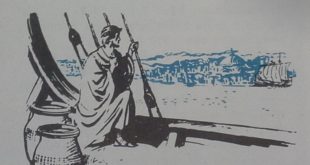Christianity was the movement that spread Across the Roman Empire Pointing the way for the rest of the ancient world toward belief in a single God. The year is 400 A.D. Andropolos paces impatiently up and down the deck of the merchant ship. He is eager to get back home; and to Andropolos, home is the city of Constantinople, a new capital of the Roman Empire. He can already see the walls and buildings of the great city shimmering in the distance. Now the ship is nearing the narrow Bosporus, the waterway where Europe and Asia are hardly a mile …
Read More »Tag Archives: Slavs
Europe Divided 1825 -1881
IN EUROPE and North America, nationalism generally led to the creation of larger states and the centralization of power. In the Austrian Empire, however, nationalism had the opposite effect; it led to the break-up of the empire and the creation of a large number of small states. The reason was that the Austrian Empire was made up of people of different nationalities, each with its own language and customs. Although the German-speaking Austrians were only about one-fifth of the total population, the ruling family, the Hapsburgs, was Austrian and Austrians held most of the important government positions. The German-speaking people …
Read More »Feudal Germany 936 -1250
THE WINTER of 1077 was one of the coldest on record in Italy. Ice and snow choked the mountain passages in the north and snowdrifts were piled high well into the south — as far south as the castle of Canossa, which was southeast of Parma. The fortified castle belonged to the countess of Tuscany and here Pope Gregory VII had taken refuge, fearing an attack by his enemies. On January 25, a man stood outside the Castle gate, barefoot in spite of the snow and cold. He was no ordinary penitent come to ask forgiveness of the pope. He …
Read More »Charles, Called the Great 771 – 814
IT WAS COLD INSIDE the great cathedral of St. Peter in Rome on Christmas day, in the year 800. The breath of the closely packed worshipers rose like steam. Although their heads were bowed in prayer, many of the worshipers stole a quick glance at the man kneeling near the high altar. He was tall and heavy, with fair hair and a flowing mustache; he was dressed in a simple tunic and a fur-trimmed cloak. When the devotions came to an end, the tall man started to rise. At that moment, Pope Leo III, Splendid in his gold-encrusted vestments, stepped …
Read More »


